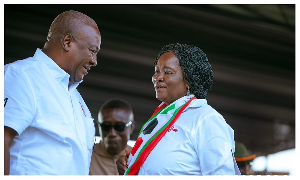 President-Elect John Dramni Mahama and his Vice Prof. Naana Jane Opoku-Agyemang
President-Elect John Dramni Mahama and his Vice Prof. Naana Jane Opoku-Agyemang
Ghana's vibrant political landscape often witnesses a predictable phenomenon following a change in government: a surge in prices of essential goods. This isn't merely inflation; it's often a calculated strategy by some traders to undermine the newly elected administration by making it appear incompetent in managing the economy.
As the Mahama-led government prepares to assume power, proactive measures are crucial to mitigate this anticipated challenge and ensure a stable economic climate for all Ghanaians. The key lies in strategic collaboration, particularly with the country's influential market queens.
The tendency for some traders to exploit political transitions for personal gain is a recurring issue. Loyalties shift, and those who perceive themselves as not aligned with the new government might resort to price hikes, creating artificial scarcity and fueling public discontent. This tactic is cynical and harmful, impacting the most vulnerable members of society – those already struggling to make ends meet. It undermines the legitimacy of the new government before it even has a chance to implement its policies, creating a challenging environment for effective governance.
The incoming administration, under the leadership of President-Elect Mahama, must address this potential crisis decisively and strategically. While punitive measures against price gouging are necessary, a purely punitive approach is unlikely to be sufficient. A more sustainable solution involves building trust and fostering cooperation with key stakeholders in the market system. This is where the expertise and influence of the market queens become invaluable.
Market queens, the powerful women who lead many of Ghana's bustling marketplaces, hold immense influence over pricing and distribution. They are often the linchpin of the local economy, possessing intimate knowledge of supply chains, trader networks, and community needs. Their active engagement is not simply desirable; it's essential for effective price stabilisation.
Leveraging the influence of the Vice President-Elect, Prof. Jane Naana Opoku Agyemang offers a compelling pathway to achieving this collaboration. As a respected and influential woman, she is uniquely positioned to build bridges between the government and the market queens. Her engagement can help foster trust and open dialogue, creating an environment where market queens are not viewed as adversaries but as vital partners in national economic stability.
Prof. Opoku-Agyemang can lead a proactive initiative that involves regular meetings with market queens across the country. These meetings should focus on open communication, addressing concerns, and jointly developing strategies to prevent price manipulation. The government can offer incentives for cooperation, such as access to credit, training opportunities, and infrastructure improvements in market areas. In return, market queens can assist in monitoring prices, identifying those engaging in price gouging, and promoting fair pricing practices within their networks.
Furthermore, the government should invest in transparent and accessible market information systems. This would allow consumers to easily compare prices across different markets, reducing the effectiveness of price manipulation. Coupled with strong enforcement of existing regulations against price gouging, this transparency can act as a powerful deterrent.
In conclusion, addressing the issue of post-election price hikes requires a multi-faceted approach. Simply relying on punitive measures will not suffice. The incoming Mahama government should prioritise building strong alliances with market queens, leveraging the influence of Prof. Jane Naana Opoku Agyeman to foster collaboration and trust.
By working hand-in-hand with these influential women, the government can create a more stable and equitable market environment, ensuring that the benefits of economic growth reach all Ghanaians, regardless of political affiliations. This collaborative approach is not only economically prudent but also represents a commitment to inclusive and responsive governance.
Farouk Aliu Mahama breaks silence following loss of Yendi seat in Parliament